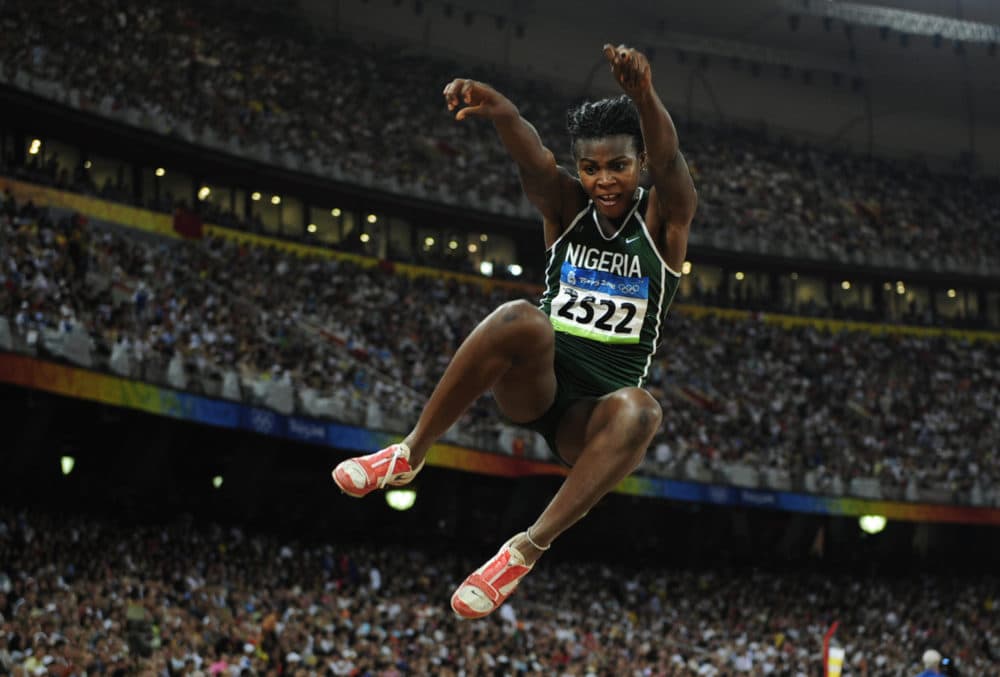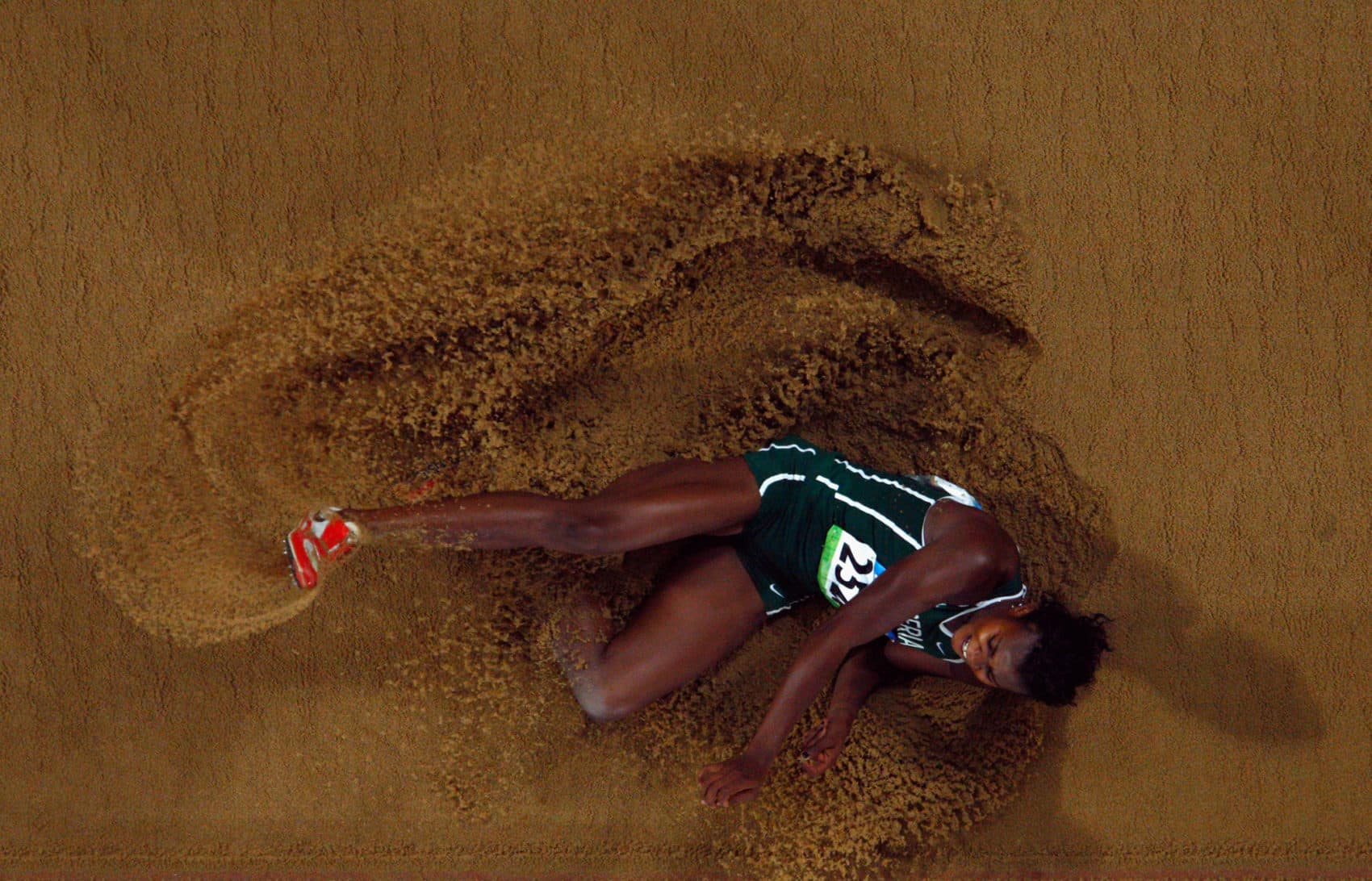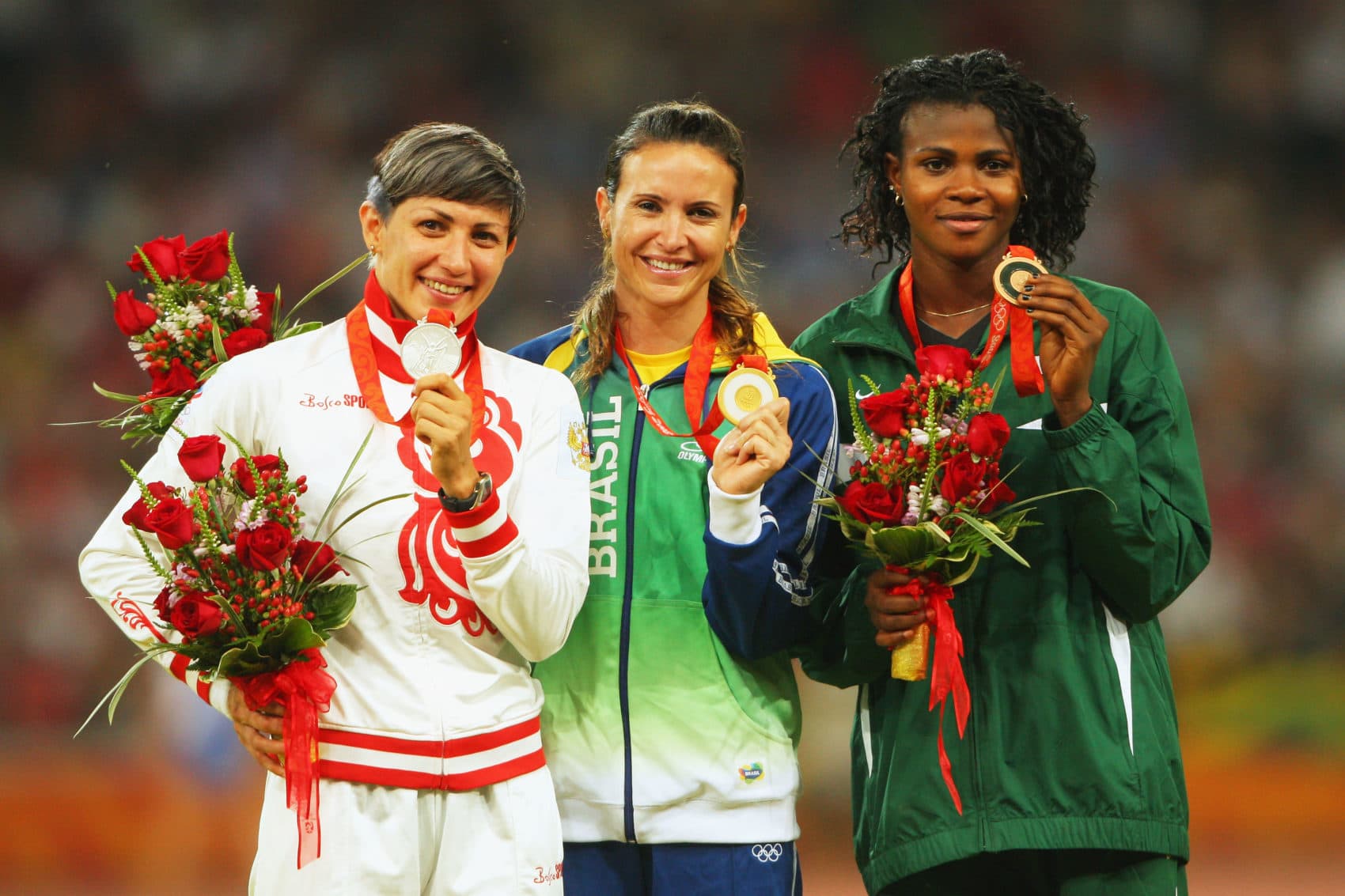Advertisement
How A First-Time Olympian Got A Second Chance At Glory

Blessing Okagbare is from Sapele, a small port city in Nigeria.
"We didn’t really have a stadium back home," Okagbare says. "We have some grass in school where we just train."
Sapele is more known for its hot weather than for being a hotbed for track and field. So, when Okagbare wanted to compete for a college in the U.S., she had one stipulation.
"She was never fond of cold weather, so we were fortunate to be located where we were," says Calvin Robinson, a former assistant coach at University of Texas at El Paso. "I think that’s how she made her decision, ultimately."
Robinson recruited Okagbare from 7,000 miles away.
"I was so happy," Okagbare says. "I thought about it like, ‘This is something that I think I need. It's really going to be good for my career.’ "
Okagbare was a superstar at UTEP, where she won four national championships in track and field. Her specialty became the long jump. During summer break, Okagbare went back to her home country of Nigeria to try to qualify for the Beijing 2008 Summer Olympics.
"And I jumped a personal-best 6.86 [meters]," she says.
That’s 22.5 feet. And it was her ticket to Beijing.
"We were all kind of on a high excitement level, to be honest with you, of just the overall atmosphere," Robinson says. "I mean, it’s the Olympics, for God's sake. Who wouldn’t be excited?"
I felt the same. I was a college student from Boston and an intern for the Olympic News Service. My job was to conduct interviews for track and field events at Beijing’s National Stadium. I was nervous, and I wasn’t even competing.
Advertisement
Blessing's Olympic Debut
Aug. 18, 2008 was the day of the Olympic women’s long jump qualifying round. Okagbare says she was overwhelmed walking into the 91,000-seat track and field stadium known as the Bird’s Nest.
"Instead of me focusing on jumping, this girl was busy looking at people compete," Okagbare laughs. "Just watching the crowd, watching the seats, the stadium, how they cheer. And I totally — I kind of lost focus."
"Everything was new to her at that time, so I could sense the nerves that she had going into the qualifying round," Robinson says. "It concerned me, to be quite honest."
The top 12 out of 44 jumpers would advance to the final round. Okagbare jumped 6.59 meters.
"I finished 13th overall," she says. "I didn’t make the final."
“I was just ready to go home. I feel like I was just useless in Beijing already.”
Blessing Okagbare
Okagbare had fallen just one centimeter short of the opportunity of a lifetime — just one spot short of the chance to jump in the final and earn an Olympic medal for her country.
"I was crying," Okagbare says. "I was staring at my coach. He felt so bad for me."
Robinson tried to console her.
"We kind of just went over and reiterated how successful a year she had had," Robinson says.
"Me, I was just ready to go home," Okagbare remembers. "Because I feel like I was just useless in Beijing already. I was just too depressed."
"You know, I was looking for the first plane home, to be quite honest," Robinson says.
"He had called the airline, and they said they don’t have no space for the flight," Okagbare says. "Like, he can’t change it, nothing — went to the airport, nothing."
Okagbare and her coach were stuck in Beijing. But the day before the final, something strange happened.
"She tells me at lunch that she had a dream that they called her back to go to the final," Robinson remembers.
"He laughed so hard," Okagbare says. "That man laughed at me."
"Lo and behold, I think we got the call later that evening that she had actually gotten placed back into the final," Robinson says.
"And I said, ‘No, I didn’t make the finals, sir,’ " Okagbare remembers. "He said, ‘No, you just made the final.’ And I was like, ‘What!?’ I screamed so loud."
One of the long jump finalists, Ukrainian Lyudmila Blonska, had been disqualified for doping.
'I Took Every Jump Like It Was My Last'
"It was a freebie, man," Robinson says. "It was like a get-out-of-jail free card, to be honest. So at that point, it was, ‘OK, you got this second opportunity. Let’s not waste it.’ We were just playing with house money, at that time."

On Friday, Aug. 22, 2008, it was time for the Olympic long jump final.
"I put a lot of stock in how an athlete moves around, what their demeanor is, during warmups," Robinson says. "When, I tell you, she probably had the best warmup of her life going into the final, I knew something special was going to happen. I didn’t know if it would equate into a medal, but I knew she was at least going to be competitive and jump very well."
International sports journalist Jeremy Inson was covering the track and field events with me.
"You could tell there was something building," Inson says. "You could see her. She sort of grew into it. Her emotions started coming through."
Okagbare was the last jumper in the starting order.
"She takes her first jump, and it’s a sound through the stadium that you hear, Robinson says. "You could always hear when she had a big jump."
"I took every jump like it was my last, and it was worth it," Okagbare says.
Okagbare recorded a personal-best 6.91 meters — good enough for the bronze medal.
"And I got that medal against all odds," she says.
Okagbare was overcome with happiness as she took the podium to receive the bronze.
"Overwhelming delight, disbelief," Inson says. "And just being caught up in the emotion of it — the joy — celebrating with her coach."
"That was probably one of the most overlooked stories of those Games," Robinson says. "It was a big deal."
Blessing's Breakout
In the span of four days, Okagbare went from falling short of her dream to earning a career in track and field.
"It was, like, my breakout moment," Okagbare says.
"That medal definitely helped catapult her to the international athlete that she is today," Robinson says.

Okagbare made the Olympics again in 2012 and 2016, but she did not win a medal. Now 30 years old, she has one more chance at Tokyo 2020 — with tempered expectations.
"Time hits us all, man," Robinson says. "Father Time is undefeated."
Okagbare is living in Texas. She is training to be a nurse. And she’s really glad she wasn’t able to catch a flight home from Beijing that day in 2008.
"These chances don’t just come," she says. "It came for a reason. And if you don’t take advantage of it, there’s something wrong with you. Something is definitely wrong with you."
This segment aired on February 23, 2019.